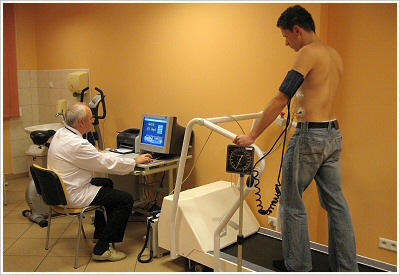 What is Arrhythmia?
What is Arrhythmia?
Arrhythmia refers to a disturbance in the rhythm of the heartbeat. Some arrhythmias are very mild and nothing to worry about (such as most cases of atrial fibrillation and premature ventricular contractions); others are potentially life threatening (such as ventricular tachycardia and severe ventricular arrhythmias).
One of the most common disturbances in heart rhythm is an atrial fibrillation—a minor arrhythmia in which the atria (the upper chambers of the heart) beat irregularly and very rapidly (up to 300 to 500 beats a minute). An atrial fibrillation is a minor disturbance because the atrium’s job is simply to fill the ventricle (the lower chamber of the heart). However, chronic atrial fibrillation does carry with it a slightly increased risk for a stroke, as blood can pool in the atria and increase the likelihood of clot formation.
Another minor rhythm disorder is premature ventricular contractures (PVCs). This arrhythmia produces an irregular heartbeat, but the heartbeat itself is normal and at a normal rate, as opposed to ventricular tachycardia, in which the beat is too fast (120 to 200 beats per minute).
Other ventricular arrhythmias tend to be more serious, such as ventricular fibrillation—rapid, uncontrolled and ineffective contractions of the heart. These arrhythmias are considered major arrhythmias because they can lead to death.
What are the Signs and Symptoms of Arrhythmia?
Many mild arrhythmias go unnoticed, or a person may feel his or her heart is beating out of pace or too rapidly (palpitations). In contrast, more serious arrhythmias can produce a medical emergency and can be associated with a heart attack.
What Causes Arrhythmia?
Arrhythmias are primarily the result of a disturbance in the electrical system within the heart that stimulates the heart to beat. Arrhythmias can also occur when sets of heart muscles develop their own beat. Magnesium and potassium deficiencies are well-known nutritionally related causes of arrhythmia.
Which Dietary Factors are Important in Arrhythmia?
A diet designed to support healthy heart function is necessary to reduce arrhythmia:
- Eliminate salt
- Eat more potassium, fiber and complex carbohydrates
- Increase consumption of celery, garlic and onions
- Reduce or eliminate saturated fats
- Increase your intake of magnesium; the best food sources are legumes, tofu, seeds, nuts, whole grains and green leafy vegetables. Fish, meat, milk and most commonly eaten fruit are low in magnesium.
Which Nutritional Supplements Should I Take for Arrhythmia?
The goals in the natural treatment of arrhythmia and many other heart diseases are to improve energy metabolism within the heart and to boost the blood supply to the heart. Magnesium, CoQ10 and hawthorn extract can achieve these goals. In minor cases of arrhythmia, I have found the natural approach usually provides all the support the heart needs to function effectively. In more severe cases, drug therapy will also be necessary; however, that does not mean nutritional and herbal measures should be abandoned.
Foundation Supplements. High potency multiple vitamin and mineral formula; Vitamin D3 2,000-5,000 IU/day; Fish oil, EPA+DHA 3,000 mg/day.
Magnesium deficiency plays a major role in many cases of arrhythmia. Magnesium improves the delivery of oxygen to the heart muscle by relaxing the coronary artery as well as improving the production of energy within the heart muscle. Take 150 to 250 mg three times per day. Magnesium bound to aspartate, citrate and malate is preferred to magnesium bound to oxide because of better absorption.
Coenzyme Q10 (CoQ10) plays a major role in energy production within the heart. In one study, the frequency of angina attacks was reduced by 53 percent with CoQ10 supplementation. Take 200 to 300 mg daily.
Hawthorn (Crataegus sp.) berry and extracts of its flowering tops have a combination of effects that are of great value to patients with angina and other heart problems. Studies have demonstrated that hawthorn extracts are effective in reducing angina attacks as well as in lowering blood pressure and serum cholesterol levels. For best results, use extracts containing either 10 percent procyanidins or 1.8 percent vitexin at a dosage of 100 to 250 mg three times daily.
How do I Know if the Recommendations are Working?
Any person with an arrhythmia or any other heart disease should have an extensive cardiovascular evaluation, including a complete physical exam to look for signs of poor blood flow; an electrocardiogram, which assesses the electrical function of the heart; an echocardiogram, which is an ultrasound procedure to assess how the heart is functioning from a mechanical perspective, and also determines the heart’s shape and size; and a complete laboratory assessment, including red or white blood cell magnesium-level determination. Serum magnesium levels do not accurately assess magnesium status in the body (many doctors may not know this fact).
Testimonials
“Dr. Murray, I was really suffering from atrial fibrillation. The drugs I was prescribed did not work, other than to make me very tired. I followed your supplement program and after three days, I could really feel the difference. Thanks.” —RB


